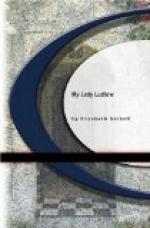in his best and leave his work in the forenoon (and
my lady liked to see her tenants come in their Sunday
clothes; she would not say a word, maybe, but she would
take her spectacles slowly out, and put them on with
silent gravity, and look at a dirty or raggedly-dressed
man so solemnly and earnestly, that his nerves must
have been pretty strong if he did not wince, and resolve
that, however poor he might be, soap and water, and
needle and thread, should be used before he again
appeared in her ladyship’s anteroom). The
out-lying tenants had always a supper provided for
them in the servants’-hall on Thursdays, to
which, indeed all comers were welcome to sit down.
For my lady said, though there were not many hours
left of a working man’s day when their business
with her was ended, yet that they needed food and
rest, and that she should be ashamed if they sought
either at the Fighting Lion (called at this day the
Hanbury Arms). They had as much beer as they
could drink while they were eating; and when the food
was cleared away, they had a cup a-piece of good ale,
in which the oldest tenant present, standing up, gave
Madam’s health; and after that was drunk, they
were expected to set off homewards; at any rate, no
more liquor was given them. The tenants one
and all called her “Madam;” for they recognized
in her the married heiress of the Hanburys, not the
widow of a Lord Ludlow, of whom they and their forefathers
knew nothing; and against whose memory, indeed, there
rankled a dim unspoken grudge, the cause of which
was accurately known to the very few who understood
the nature of a mortgage, and were therefore aware
that Madam’s money had been taken to enrich
my lord’s poor land in Scotland. I am sure—for
you can understand I was behind the scenes, as it
were, and had many an opportunity of seeing and hearing,
as I lay or sat motionless in my lady’s room
with the double doors open between it and the anteroom
beyond, where Lady Ludlow saw her steward, and gave
audience to her tenants,—I am certain,
I say, that Mr. Horner was silently as much annoyed
at the money that was swallowed up by this mortgage
as any one; and, some time or other, he had probably
spoken his mind out to my lady; for there was a sort
of offended reference on her part, and respectful
submission to blame on his, while every now and then
there was an implied protest—whenever the
payments of the interest became due, or whenever my
lady stinted herself of any personal expense, such
as Mr. Horner thought was only decorous and becoming
in the heiress of the Hanburys. Her carriages
were old and cumbrous, wanting all the improvements
which had been adopted by those of her rank throughout
the county. Mr. Horner would fain have had the
ordering of a new coach. The carriage-horses,
too, were getting past their work; yet all the promising
colts bred on the estate were sold for ready money;
and so on. My lord, her son, was ambassador
at some foreign place; and very proud we all were of
his glory and dignity; but I fancy it cost money,
and my lady would have lived on bread and water sooner
than have called upon him to help her in paying off
the mortgage, although he was the one who was to benefit
by it in the end.




